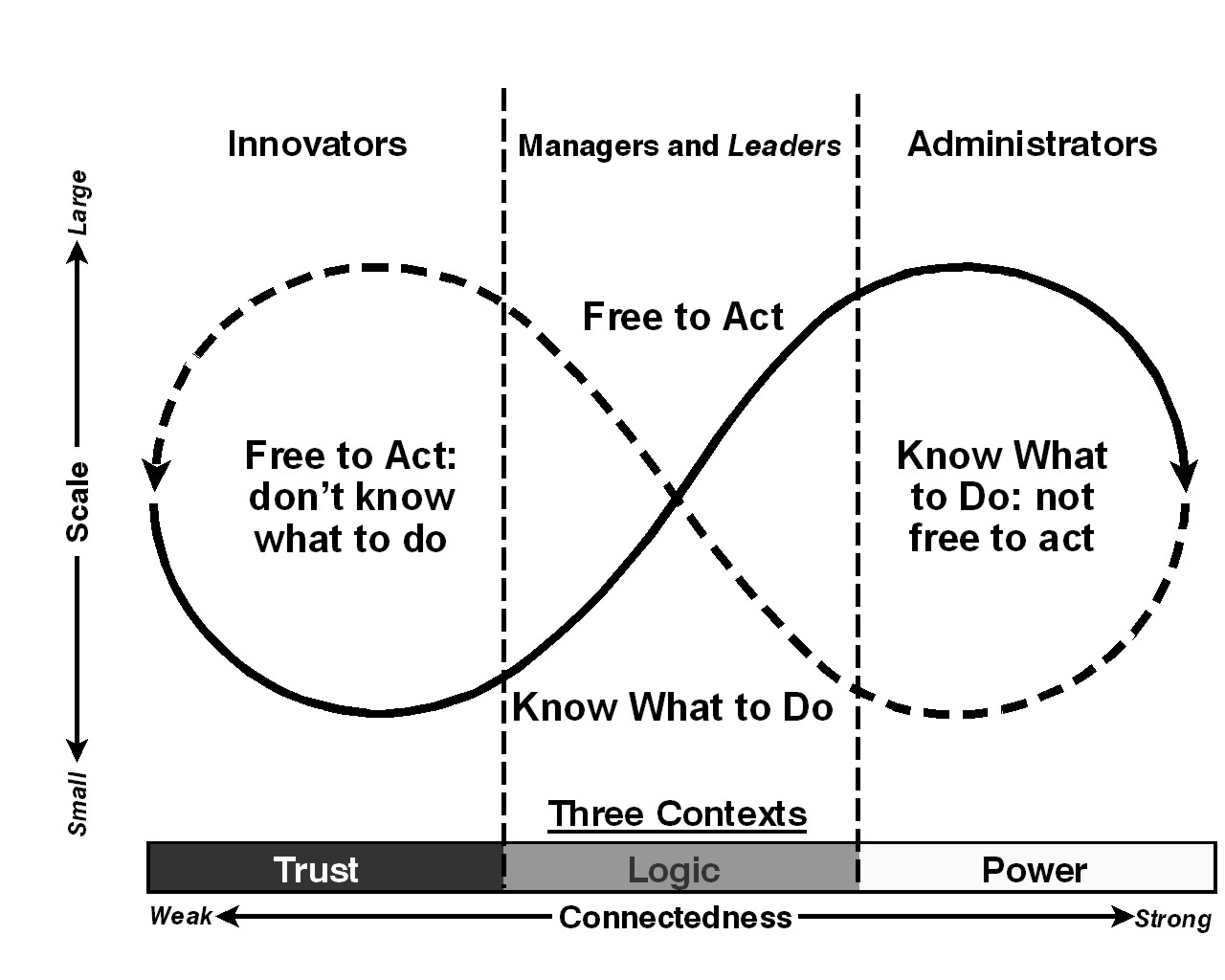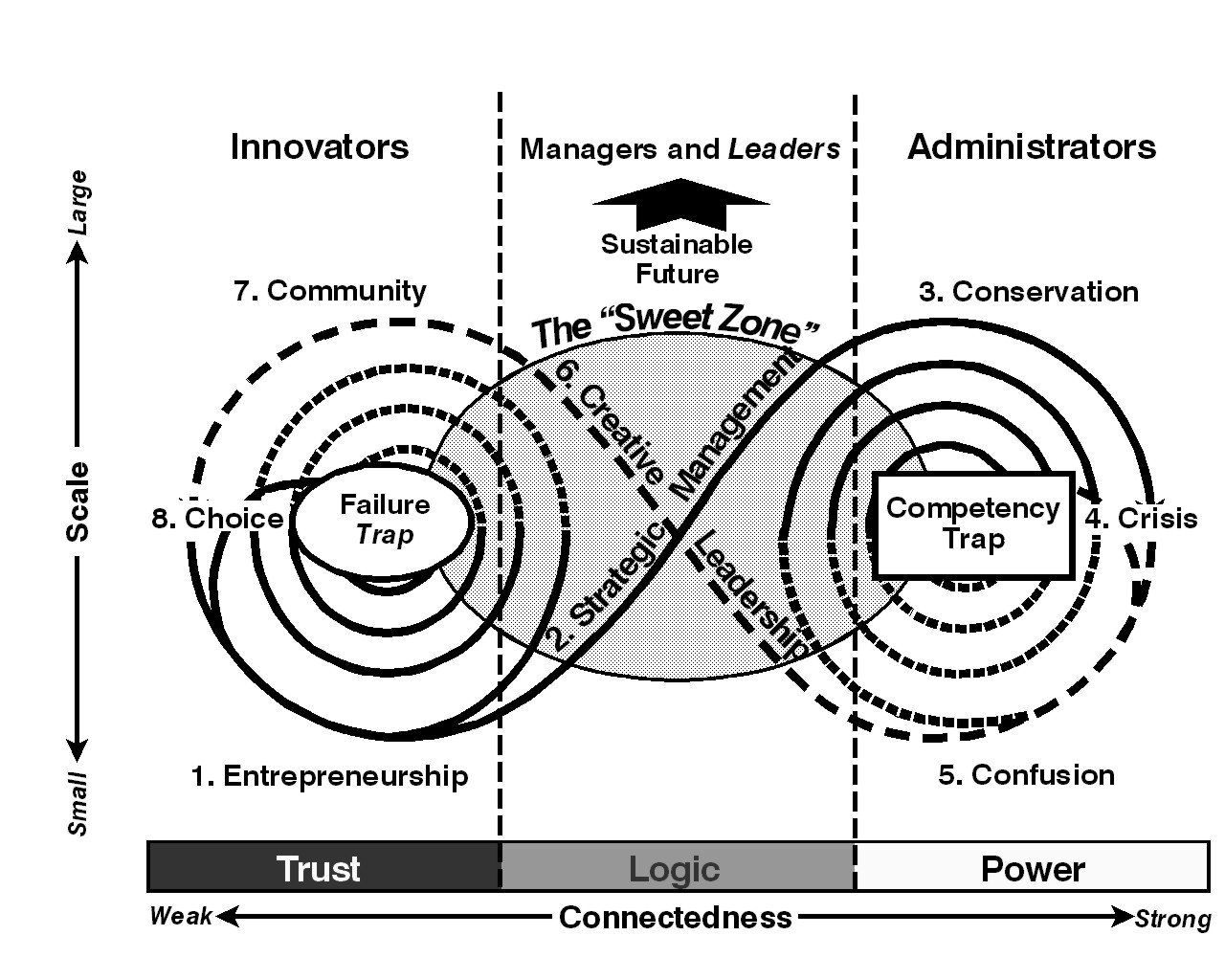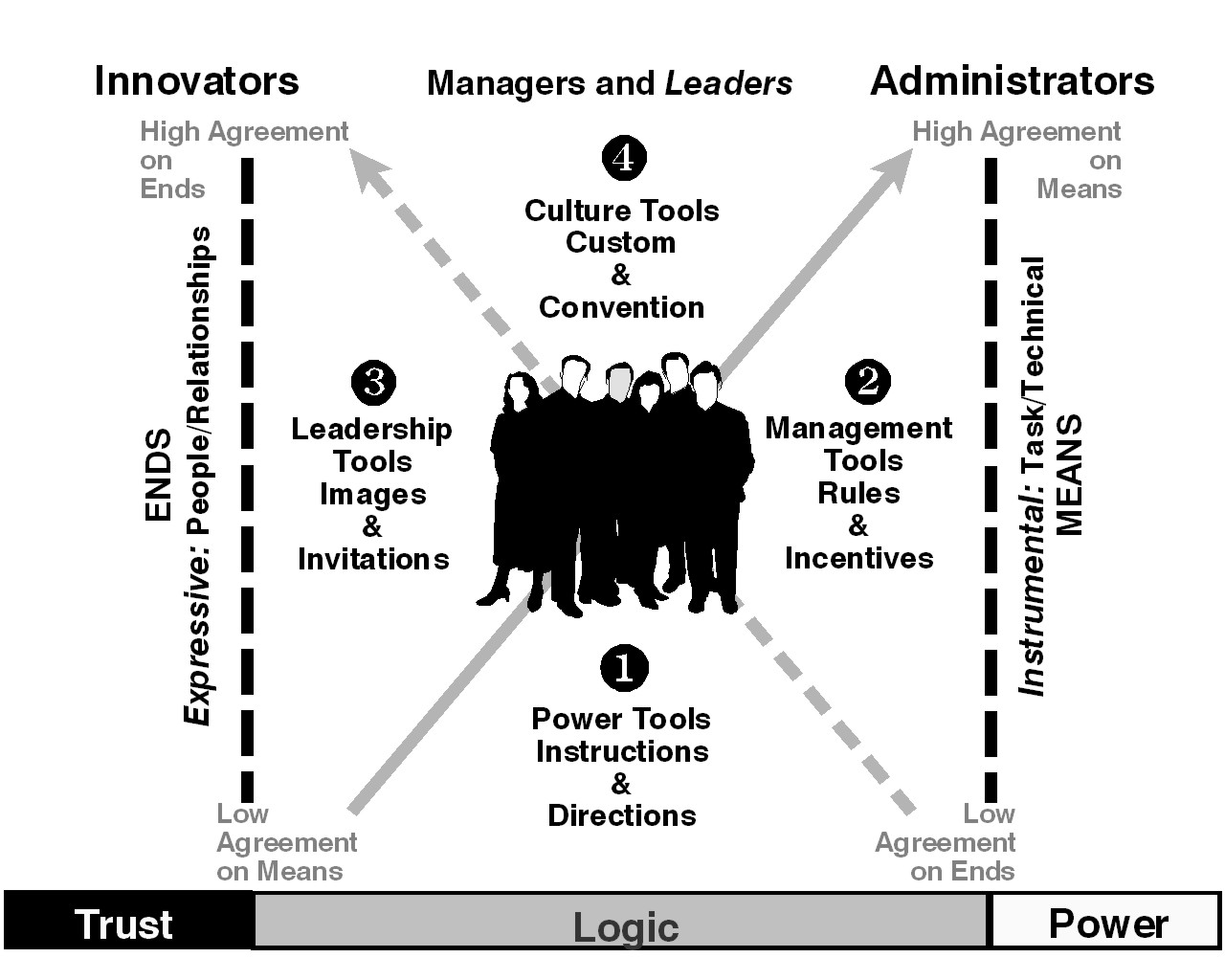A boldly original, radical retake on the practice and theory of management from the “both…and” view of “ecologics”, that embraces and contains the “either/or” logic of economics. The emphasis is on sustainability, rather than maximization. The contention is that capitalism and management are better viewed through an ecological lens than a purely economic one.
Ever since the attempt to professionalize management in the late 1950s, management theorists have assumed that if humans weren’t rational in a logical way, then they ought to be. The economists called them “rational-agents”. For half a century management science's vision of the ideal management mind has been factual and forensic; somewhat like that of the hyper-logical Mr. Spock in Star Trek. Facts were divorced from values, theory from practice, reason from emotion and mind from body. Thus the fact that managers’ actual minds seemed to function a bit like those of Homer Simpson and his family, simply added grist to the academics’ mills! They began to search for general, context-free “principles” that could be applied to organizations in any situation. Practical wisdom, in the form of executives and their “war stories”, was expelled from the academy.
We now know, thanks to work in many fields, that idea of rational-agency is deeply flawed. We never were and never can be rational like Mr. Spock, except for short periods of time in special situations (ideally scientific experiments). The rest of the time our minds function just like Homer’s and those of his family’s. We are ecologically rational – our embodied minds have evolved to extract cues to action from the situations in which we find ourselves. This means that contexts matter and history matters. This explains why the management academy has struggled so with arguments about “rigor” and “relevance” and why “implementation” of abstract “principles” has proved so difficult in practice. The implication is that really useful management advice must always be context-specific.
Management institutions and managers everywhere need to acknowledge this deep-seated problem explicitly and the dismal, misanthropic form of capitalism that it has created. We should recognize too that this approach has resulted in the progressive disenchantment of the practice of management.
We need to revisit the field’s intellectual foundations. What seemed like rock fifty years ago has been eroded by our unsatisfactory experiences, by concern for our future and by new knowledge about our minds and our nature. The house of management now sits on sand. We need to question again our ontology (what is reality?), our epistemology (what is our relationship to reality?) and our methodology (how do we go about exploring what can be known?). After decades of perfecting our means we must renew our ends, our mission and purpose.
Anything less, to quote from the MIX site, will represent a “thin veneer… over a tradition-encrusted structure”.
The solution is a complete reconfiguration of the theory and practice of management upon a foundation of ecological rationality. This eco-logic of “both…and” embraces rather than replaces (and thus contains) the “either/or” neoclassical economic concept of rationality, upon which management theory has hitherto been based. Facts are reunited with values, reason with emotion, and ethics (and our environment) become a necessary, integral part of management. Coupled with this ecological rationality is the recognition of humankind’s hunger for compelling narratives – stories – as their primary means of understanding cause-and-effect and making meaning in complex systems in a chaotic world. The result is a new, compelling narrative for management and capitalism: a human story that economics-based frameworks cannot tell.
The re-enchantment of management and the renewal of capitalism require answers to the following questions at every level of our institutions and organizations:
- What’s the situation?
- Where are we going?
- Who benefits or loses and by what mechanisms of power?
- Is this development desirable?
- What, if anything, should we do about it?
- Who am I? Who are we?
- What do people like me/us do in situations like this?
- What’s the situation….
The reconfiguration of management based on our default ecological rationality helps frame and address these questions. The advantages of this approach are many:
- By recognizing our true nature it begins to heal the souls of both people and the organizations for which they work.
- By emphasizing the importance of context it helps us understand the situations in which people can realize their potential.
- Renewal is embedded into the dynamics of the “ecocycle”, which reflects the trajectories of complex systems over time.
- The ecocycle dynamic shows us how both sides of the manager’s brain are essential and how they can work together in creative harmony: ecological rationality with rational agency, Homer Simpson and family with Mr. Spock.
- The ecological perspective recognizes that power changes its mode and location throughout the life of an organization (as well as societies and economies). It shows why and how, especially as these entities age, power has to be continually redistributed.
- Balance and harmony are constantly evidenced in nature on whose dynamics the ecocycle is based. The ecological perspective applied to organizations shows us both how simple (but not easy) such balance and harmony can be to achieve.
The evidence is becoming overwhelming: Our brains (and bodies) are collections of special-purpose “apps”, cobbled together by evolution. Our embodied minds have evolved to extract cues to action from the situations in which we find ourselves. We are seekers of meaning and narrative truth: contexts matter, history matters and communities matter. This is in sharp contrast to the belief that we should be “rational agents”, concerned only with scientific truth and exercising a universal, Cartesian rationality, using context-free principles. Human nature must be recognized for what it is; an ancient selfishness, overlaid with a thick layer of cooperation and finished with veneer of reason.
The ecological framework covers a vast expanse of management ideas and practices and integrates them into a coherent whole. The resulting synthesis has the potential to form the nucleus for the renewal of capitalism and the “re-enchantment” of management.
This approach is based on my book, The New Ecology of Leadership: Business Mastery in a Chaotic World (Columbia University Press, April 17 2012). See attached materials for further details.
The solution is presented as a dynamic mental model that enables its users to
- Hone their contextual intelligence – the practical wisdom that allows them to understand the types and dimensions of organizational contexts and how to frame them. For a context is not just a hard, unchangeable thing “out there”; it is also very much a product of how we make sense of the world “in here.” Thus, we can often alter a context by changing how we name and frame a situation.
- Design, evoke, and even control some contexts and anticipate others so that they can avoid, counter or, at the very least, prepare for them. They can use it to find and focus the behaviors that produce the results needed by the organization, its stakeholders, and the community and society at large.
- Appreciate that stability and change, far from being opposites, are inextricably bound up with each other. They are complements. You can’t have one without the other. It is our failure to appreciate this subtle relationship that accounts for the fact that we are continually surprised by crises of all kinds and that the world often appears to be more chaotic than it really is.
- Comprehend both the complexity and simplicity of innovation by seeing not only why organizations grow with such effortless ease at some stages of their lives but also why, in the longer term, nothing fails like success. They will see how organizations are conceived in passion, born in communities of trust, grow through the application of logic, and mature in power. They will comprehend why powerful organizations decline as they age and how their strengths become weaknesses in changing circumstances. For the trappings of success and the contexts it creates can inhibit learning, and the resulting decline can be both difficult to sense and intractable to manage.
- Find the “sweet spot” in space and time, a “zone” where an organization can dwell for an extended period through a process of continual learning and renewal. The length of this period depends on many factors, but the key issue of concern here is the ability of both leaders and managers to be effective architects of choice, designing contexts with the optimal combinations of passion, reason, and power. When this happens, resources flow to the right places in the system almost without direction.
- Understand relationships and how we are constantly engaged in assessing the situations we are in, gauging how we feel about them, looking for systems of cause and effect, and trying to understand the power dynamics present. Whenever we deal with people, we are always thinking in contexts of emotion, reason, and power.
- Help them ask better questions of reality and tell more compelling stories about it. The resulting understanding of their aptitudes and passions will, given the right opportunities, guide them for the rest of their lives.
Some folk are going to love The New Ecology of Leadership with its assumptions of ecological rationality and narrative truth. Entrepreneurs tell us that the ability to see patterns and make new associations is critical to the innovation process. Reflective practitioners will say that they knew all along that they were weaving the two systems together, with our basic, shared humanity as the warp thread and our ability to improve some decisions through logic and calculation as the weft. Together they can make a fine tapestry. More generally, the liberal arts are going to welcome the new appreciation of what they do; showing us how we can think about the world in just as many different ways as we can experience it.
In general, reflective practitioners – people who act to think, just as often as they think to act – will recognize the ecological model as something that they already do. They will find that the model resonates with their experience. They will welcome the new framework because it helps them both file and access their experience, education and training.
The ecological mental model suggests where the new framework might be well received – on the edges of institutions and in open patches where young ideas can flourish. In an ecosystem change begins on the periphery and works its way to the core. Entrepreneurs, young managers, new businesses and new institutions-in-the-making, with no stake in the status quo are likely to prove to be fertile ground. Cultures with a history of systems thinking, particularly those in Europe and in the Orient are also likely to be receptive to a fresh, systems-based framework. The origins of the ecological mental model actually lie in Taoist philosophy, an early systems view of the world, so in many ways the ecological perspective offers an integration of Eastern and Western modes of thought.
The first public step is the publication of the book that is the subject of this entry. Extensive work in social media suggests that the ecological images of “fertilizing and seeding” in “edges” and “open patches” of the internet are highly appropriate. The launch of the book has been “pre-seeded” by extensive participation in LinkedIn discussion groups, active blogging, and regular Facebook and Twitter activity.
These sound like puny moves when measured against the scope of the challenge, but there are other forces and dynamics active and as a complex system approaches criticality - a tipping point - small causes can have very large effects. In any event, as the Taoist sage Lao Tzu put it, "The journey of a thousand miles begins with a single step."
The New Ecology of Leadership is extensively footnoted and referenced and the contributions from many others are acknowledged in the book.






You need to register in order to submit a comment.